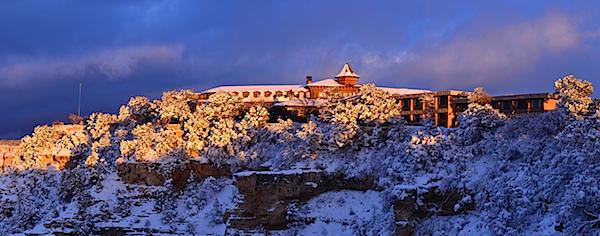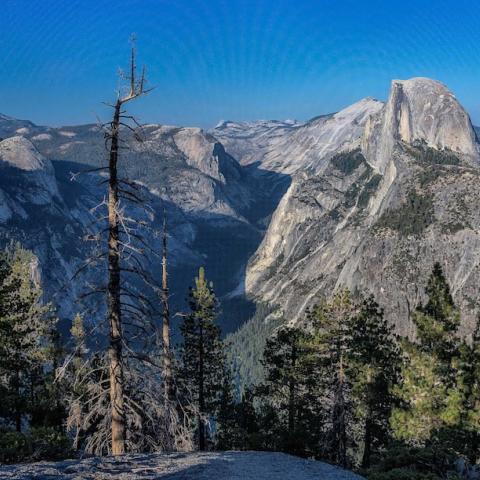
A section of the U.S. Code might allow the National Park Service to ignore trademarks attached to names such as "The Ahwahnee Hotel"/Kurt Repanshek
Efforts by concessionaires to capitalize on the names of such iconic lodges as The Ahwahnee Hotel in Yosemite National Park and the El Tovar Hotel in Grand Canyon National Park might prove to be pointless under a section of the U.S. Code.
That provision, Section 302106, specifically gives the National Park Service the right to "retain the name historically associated with the building or structure" regardless of any trademark. That language is contained within H.R.1068, which became law in mid-December.
Sec. 302106. Retention of name
Notwithstanding section 43(c) of the Act of July 5, 1946 (known as the Trademark Act of 1946) (15 U.S.C. 1125(c)), buildings and structures on or eligible for inclusion on the National Register (either individually or as part of a historic district), or designated as an individual landmark or as a contributing building in a historic district by a unit of State or local government, may retain the name historically associated with the building or structure.
National Park Service officials in Washington did not immediately respond to Traveler inquiries about Section 302106 and whether they would cite it to resolve recent developments where concessionaires have already received, or have applied for, trademarks to building names in Yosemite and Grand Canyon.
Delaware North Co., through its Yosemite subsidiary, notified the Park Service last summer that it had placed a $51 million valuation on intellectual property it held in Yosemite, including trademarks on such properties as The Ahwahnee Hotel, Curry Village, and the Wawona Hotel. Xanterra Parks & Resorts moved in similar direction in Grand Canyon in November when it applied for trademarks to most business names in use on the South Rim of the national park.
But under Section 302106 those trademarks might prove worthless, as most, if not all, the buildings the names are attached to have historic significance.
In Yosemite, there are more than 40 historic properties comprising sites, objects, buildings, and districts listed in the National Register of Historic Places. The park is also home to five National Historic Landmarks: The Ahwahnee Hotel, Le Conte Memorial Lodge, Parsons Memorial Lodge, the Rangers' Club and the Wawona Hotel & Thomas Hill Studio District.
Yosemite's historic districts include Camp Curry, and listings on the National Register of Historic Places include the High Sierra Camps at Glen Aulin, May Lake, Merced Lake, Sunrise, Tuolumne Meadows, and Vogelsang. The listings of Wilderness cabins include Buck Camp Patrol Cabin, Frog Creek Cabin, Lake Vernon Snow Survey Shelter, Sasche Springs Snow Survey Shelter, Merced Lake Ranger Station and Snow Survey Cabin, Ostrander Lake Ski Hut, and the Snow Flat Ranger Station and Snow Survey Cabin.
Dan Jensen, president of DNC Parks & Resorts at Yosemite, said Monday that he was unaware of Section 302106 and didn't know how it might affect the company's $51 million claim.
"'I've never seen that before you sent it, so I don't really know what to make of it," he said during a phone call. "Somebody does need to figure out what this means."
Speaking to the overall issue of intellectual property that DNC claims in its Yosemite operations, Mr. Jensen said there needs to be a meeting with Park Service personnel to clearly identify what intangible property DNC has accumulated over the years and assign a value to it.
"I still think that's the step that''s been missing," he said. "What's the list of assets and what are they worth?"
The issue of intellectual property at Yosemite and DNC's ownership came up as the Park Service was soliciting bids for a 15-year concessions contract that is to begin in 2016. DNC officials, hedging against the possibility that they might not win that contract, wrote the Park Service to outline their intellectual property assets and the $51 million valuation they had placed on them. If they lost the next contract, they wanted to receive that amount in compensation from the winning company.
The Park Service initially balked at including the $51 million in the contract prospectus as part of DNC's possessory interest that it would have to be compensated for. But in an amendment to the prospectus for the new contract, the agency said the winning bidder, if not DNC, could rename buildings in the park. A bit later, the Park Service amended the prospectus to place a $3.5 million valuation on DNC's intellectual property claims.
Just as DNC said a third party had appraised the value of its intellectual property at $51 million, the Park Service said it had used an outside appraiser to come up with the $3.5 million valuation. Park Service officials in Yosemite and in the concessions office of the agency's Pacific West Region did not respond to inquiries as to how they arrived at that dollar figure, or why they came up with the figure while the Solicitor's Office in Washington was researching whether DNC could seek compensation for the trademarks.
Regardless of whether Section 302106 resolves the trademark issue, DNC officials still would like to sit down with Park Service officials to sort through the value of other intangible property they hold in Yosemite.
"It's not an issue of if you're going to figure out value. At some place you need to figure out value," Mr. Jensen said. "Their $3.5 million, there is no list and there is no indication of how they got there. So something is still missing."
Last week the Park Service announced that it had received at least two bids for the contract. The winning concessionaire is expected to be named this coming summer.

Xanterra Parks & Resorts has applied for a trademark to "El Tovar."/NPS
At Grand Canyon National Park, where Xanterra Parks & Resorts has applied for trademarks for most businesses on the South Rim, buildings already listed on the National Register of Historic Places include the El Tovar Hotel, the Grand Canyon Village Historic District (which includes the El Tovar as well as the Bright Angel Lodge, the Buckey O'Neill Cabin, Lookout Studio, Hopi House, the Kolb Brothers Studio, the Grand Canyon Depot, and the Grand Canyon Railway), the Desert View Watchtower Historic District, and the Hermit's Rest concession building.
Trademark applications for "Phantom Ranch," "Bright Angel Lodge," "Kachina Lodge," "Yavapai Lodge," "Maswick Lodge," "Red Horse Cabin," "Arizona Room," "Lookout Studio," "Buckey O'Neill Cabin," "Thunderbird Lodge," "Trailer Village,""Hopi House," "Hermit's Rest," and "Desert View Watchtower," were filed by Xanterra last November.
Park Service officials in Washington have said they were monitoring the trademark application process and would raise concerns, if merited, at the appropriate public comment period.




 Support Essential Coverage of Essential Places
Support Essential Coverage of Essential Places







Comments
Good work, Kurt. You should send the National Park Service a bill for your services. A host of even older laws and precedents comes to the same conclusion, but as Mr. Jensen says, ah, well, there must be money in there somewhere! I still wouldn't give him a dime, or Xanterra, for that matter. These people are way out of line. Those names belong to us.
Now, I wonder who is eating crow at the Park Service this morning? How do we say it in America? I believe it's called freedom of the press.
Yes Kurt, nice find. Don't know that it would stand though. If DNC can document ownership, seems like it would be an unconstitutional "takings".
Would have to think Xanterra has the better case since their preincarnation actually built most if not all the iconic buildings that hold so many cherish at South Rim. Admit much has changed in character with the Denver oriented Xanterra. I believe the only one at corporate and above that has any real altruistic appreciation for the Canyon and has hiked with his family to Phantom Ranch for a stay and hiked out is Phillip Anschutz, the owner of Xanterra Corp. With him I have some hope. Just wish he would/could put forth more of his character in all that's going on at the Park. Everyone would benefit in many ways, I've always believed.
Excellent Kurt, just excellent.
Harry Butowsky
Great research and discovery, Kurt!!! This is just wonderful!
Agree Harry.
EC--
Maybe not.
I am not a lawyer, but listing in the National Registry of Historic Places requires not only nomination and vetting that it is historic and important enough (and in good enough shape), but also the explicit assent of the property owner at the time of the listing. The National Registry and local equivalents provide substantial tax savings to the property owners, whether tied to the cost of preservation (in the NRHS) or property taxes (most local registries), as well as publicity value and access to support for preservation. I would argue that being listed in the national registry itself increases the value of the name or place in terms of publicity and sometimes tax abatement. At least local listings get tied to the property title: you can't take the tax benefits for years then unilaterally cancel when you want to develop, and the designation goes with the property when it is sold. Therefore, I think that the benefits to the owners/concessionaires of listing and its optional nature (at the time of the initial listing) prevent this regulation from being a taking of private property.
The big thing I don't understand is HR 1068 enacted last December. It is "Positive Law Codification" which is not supposed to change anything, but only reorganize and clarify existing law that is scattered throughout US Code. I think that means that the retention of historic names was prior law, but I don't have the time nor the skills to track through the prior law. If it is not part of prior law or regulation, then DNC may have a case, depending on any odd clauses in the prior law establishing NRHP.
All in all, yet another example of why I'm glad I'm not a lawyer.
It may require permission and require certain actions to maintain listing but I am fairly certain it doesn't transfer ownership.
And even if a law codification, unless there is a contractual agreement, the government can't take property without just compensation.